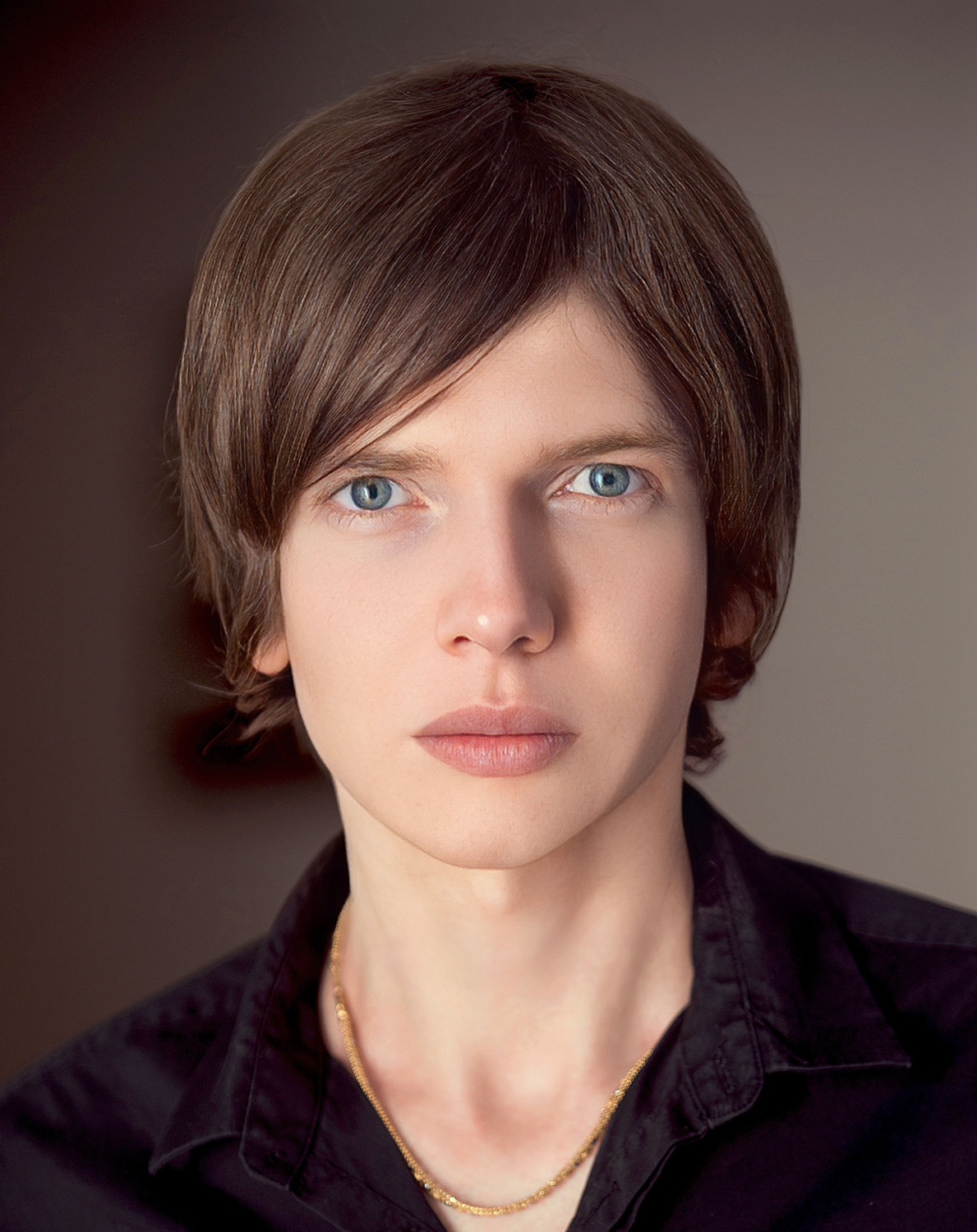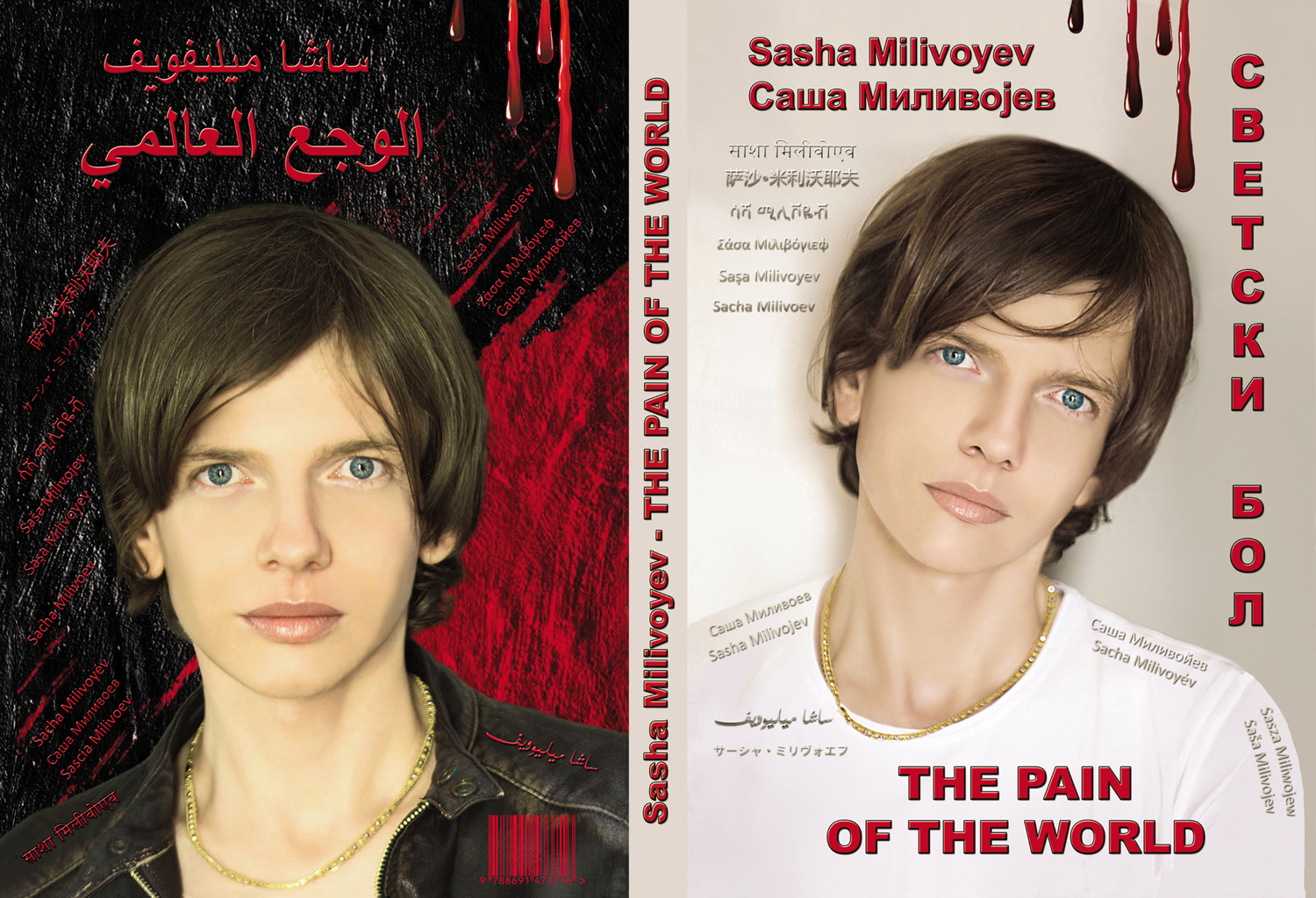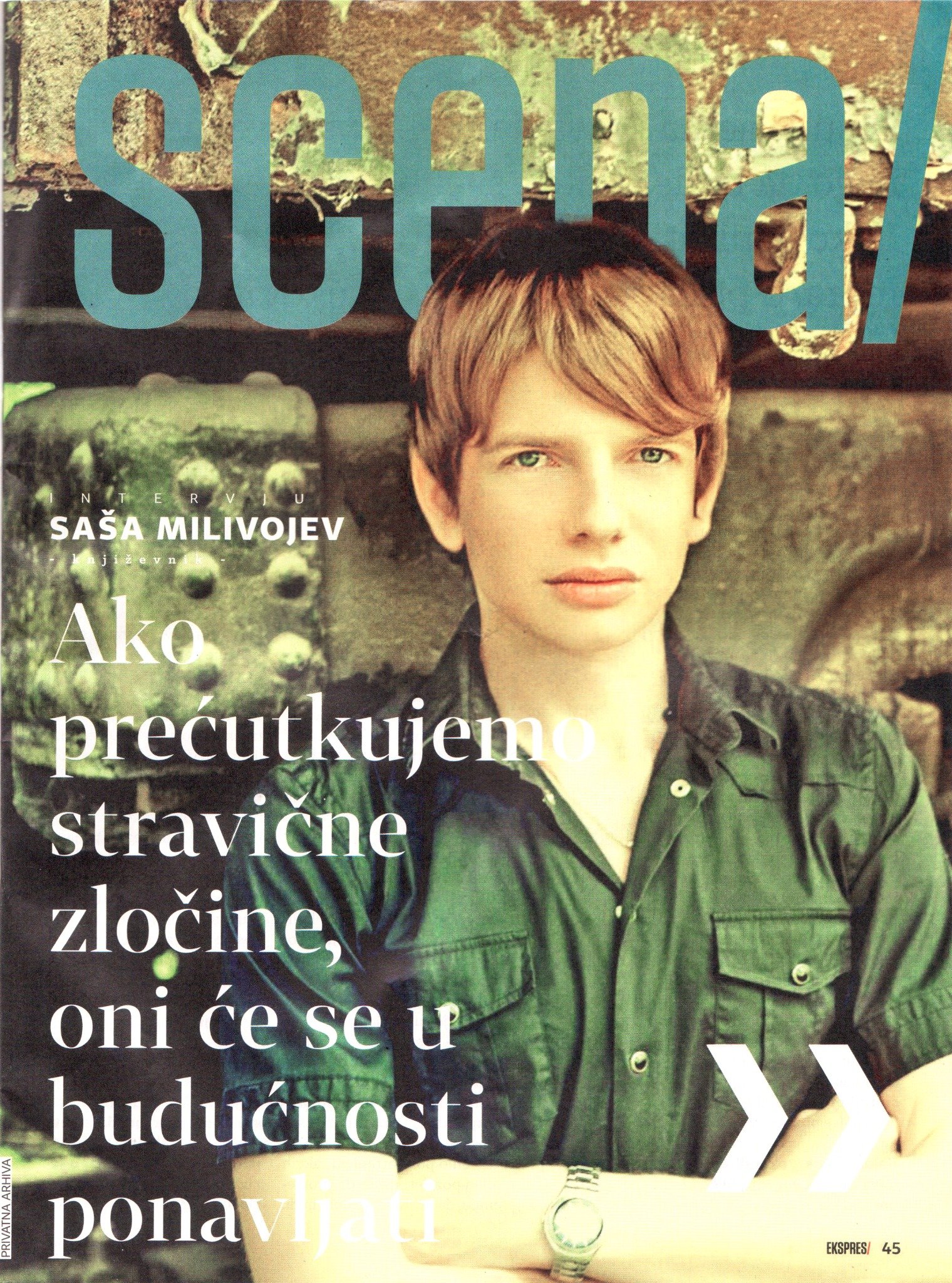


Saša Milivojev
IF WE KEEP SILENT ABOUT HORRIFIC CRIMES,
THEY WILL BE REPEATED IN THE FUTURE
EXPRESS MAGAZINE, INTERVIEW, SCENE
June 5, 2024. Serbia. Published by Srećko Milovanović
A poet has no right to
beautify reality but to be an honest witness of the times. It is easy to write
about beautiful nature, the sound of the sea, birds on the branch, fairy-tale
beaches, and violets, but...  Life is not a fairy tale.
Life is not a fairy tale.
Writer Saša Milivojev, author
of the novel "The Boy from the Yellow House," whose literary works have been
translated into twenty languages, returns to the Serbian literary scene after
more than a decade, as he himself says, of "exceptional creative wandering."
Milivojev returns with a new collection of poetry, "The Pain of the World,"
which is a creation in three languages – Serbian, Arabic, and English.
The author spent years around the world creating this collection, exploring deep
emotional and existential themes through his personal experience and broader
social context. Reviews for this collection were written by Professor Emeritus
PhD Rade Božović, former dean of the Faculty of Philology, and Professor PhD
Mila Alečković, a renowned expert in psychiatry and psychology.
In an interview with the weekly "Express," Saša Milivojev reveals details of the
themes in "The Pain of the World," talks about his creativity and travels around
the world, and discloses whether today's world has changed him.
How would you characterize the new poetry collection "The Pain of the
World"?
"Although it is depressing, terrifying, heavy, a horror story, I hope that
readers will find their place in these verses, that they will be emotionally
struck and inspired to think about broader social and philosophical issues, to
think about what each of us can do to change the world we live in. 'The Pain of
the World' is a work that strives to connect people and encourage dialogue about
universal themes that affect us all, regardless of our different life
circumstances. I want 'The Pain of the World' to be an experience that will
leave a lasting impression and inspire people to view the world from different
perspectives."
Why is the book titled "The Pain of the World"?
"Not only because world pain is an important theme in the history of literature,
my late friend Isidora Bjelica told me that she and I suffer from Weltschmerz,
and that there is no cure for it. In my perception of the world, the world is
indifferent to the world as it really is: terrible, both beautiful and
disgusting, wonderful and miserable, cruel, evil. People need to be served all
these images of a terrible world, in the hope that by observing such images we
will want to change something, to become better people. This is a way to evoke
empathy and compassion for all people going through difficult times. The concept
of Weltschmerz denotes a feeling of melancholy and sadness that arises from the
awareness of the world's imperfections and the incompatibility between reality
and idealism. The title 'The Pain of the World' reflects a sense of deep
suffering and disappointment about the state of the world. It points to the
depth of emotional experience that readers can expect in the book. 'The Pain of
the World' suggests themes concerning trauma. My poetry is not just a personal
cry, a personal pain, but a collective one, a cry of all people on the planet
who feel sorrow, helplessness, and anger because of the injustice or suffering
that the world experiences. The concept of 'The Pain of the World' reminds us of
our interconnectedness and responsibility towards others and the importance of
solidarity and active engagement in solving problems that affect people around
the world. This is a universal human epic about the sufferings of people."
When one researches what your book is about, one encounters horrific
scenes. Why did you feel the need to write poetry about such human sufferings,
atrocities, about horrifying monstrous war crimes?
"A poet has no right to beautify reality but to be an honest witness of the
times. It is easy to write about beautiful nature, the sound of the sea, birds
on the branch, fairy-tale beaches, and violets, but... Life is not a fairy tale.
If we keep silent about horrific crimes, they will be repeated in the future. As
a poet, I feel obliged to explore and express reality as it is, without
beautifying or avoiding those parts that are painful or unpleasant. My poetry is
not just a reflection of reality, but a call to action – a call for compassion,
understanding, and engagement in creating a better world for all of us."
Which wars are you specifically referring to, and are the images in your
poetry inspired by real events?
"Of course, everything is true, I didn't make anything up, it's not fiction. I
drew ideas directly from the indictments of the War Crimes Prosecutor's Office
and police reports, and I turned those horrific images, descriptions of crimes,
into verses. I detailed the crimes in the Gnjilane Internat, the consequences of
the use of chemical weapons in Syria, and how children in Yemen are dying of
hunger. I believe it is important that these horrific events are not forgotten
and that they are spoken about to shed light on the dark sides of human nature
and encourage dialogue about their causes and consequences. I will certainly
write verses about the genocide in Palestine. It is my moral obligation; there
was no genocide in Srebrenica, the real genocide is what is happening today in
Gaza, 15,000 dead children!"
Suffering and pain also marked your novel "The Boy from the Yellow House."
How do you compare the Yugoslav wars and current world events? Can poets change
anything?
"What the Serbian people survived – no other on the planet did. The Yellow House
is, in my opinion, the most horrific crime that happened in the history of
mankind. In front of the whole world, more than 2000 missing people, civilians,
whose organs were harvested! The skinned Serbian children's skin flew all over
the world. Nothing is comparable to that suffering; that is the end, there is no
further. Just as the Yugoslav wars left deep scars on society and individuals,
so do current world conflicts leave long-term consequences, including trauma,
divided societies, instability, loss of identity, and cultural heritage. This is
where poetic inspiration can be found. Poets can advocate for peace,
reconciliation, and tolerance as a response to conflicts and violence. Their
poems can be a call for solidarity, understanding, and dialogue as a path to
building lasting peace. Poets can express compassion for the victims of
conflicts and raise awareness about their sufferings to inspire others to engage
in providing help and support. Poets encourage empathy and understanding among
people."
What is the meaning of poetry for you?
"For me, the meaning of poetry lies in the ability to express deep emotions,
thoughts, and experiences in a way that transcends ordinary speech. Poetry is
not just the art of expression but also a path to truth. Poetry is a way to
capture the essence of human existence, to explore the depth of the soul, and to
express complex ideas through the beauty of language and form. Poetry is like a
mirror that reflects the essential aspects of human experience and encourages us
to think more deeply about the world and ourselves. The poet deals with the
essence, seeking answers to questions that trouble us all. Poetry is an
ontological quest, a journey through the cosmos of human experience, where
verses become existential testaments. What is revealed through poetry is not
only a phenomenological image of the world but also a transcendent harmony
between the spirit and reality. As a poet, I question ontological paradigms,
gaze into the abyss of light and darkness, seeking meaning in that movement.
Poetry can be understood as a hermeneutic process, where each word becomes a
symbol, and each verse becomes a hermeneutic key. The poet interprets the
symbols of human existence, deciphering the deep structures of the mind and
heart. Through the dialectic of poetic form, I explore questions of existence,
meaning, and transcendence, trying to illuminate the paths to inner and outer
truth. Poetry, in its essence, can be considered a creative act of metaphysical
reflection. Through rhythm, metaphors, and symbols, the poet enters the deep
depths of the human soul, exploring the fundamental aspects of existence. Each
poem becomes an archetypal seal that reveals layers of collective consciousness
and the subconscious mind. Poetry is a constant dialectic between opposites –
light and darkness, love and pain, life and death. The poet is an ontological
explorer who bravely faces the paradoxes of existence, trying to understand the
infinite complexity of human existence. Ultimately, poetry becomes a ritual of
transformation, where words become the alchemy of the soul, turning suffering
into beauty, pain into hope, and sorrow into transcendence. Through the poetic
act, we strive to reach the essence of human experience and discover the deep
connection between the individual and the universe."
Poetry is a way to
capture the essence of human existence, to explore the depth of the soul, and to
express complex ideas through the beauty of language and form. Poetry is like a
mirror that reflects the essential aspects of human experience and encourages us
to think more deeply about the world and ourselves. The poet deals with the
essence, seeking answers to questions that trouble us all. Poetry is an
ontological quest, a journey through the cosmos of human experience, where
verses become existential testaments. What is revealed through poetry is not
only a phenomenological image of the world but also a transcendent harmony
between the spirit and reality. As a poet, I question ontological paradigms,
gaze into the abyss of light and darkness, seeking meaning in that movement.
Poetry can be understood as a hermeneutic process, where each word becomes a
symbol, and each verse becomes a hermeneutic key. The poet interprets the
symbols of human existence, deciphering the deep structures of the mind and
heart. Through the dialectic of poetic form, I explore questions of existence,
meaning, and transcendence, trying to illuminate the paths to inner and outer
truth. Poetry, in its essence, can be considered a creative act of metaphysical
reflection. Through rhythm, metaphors, and symbols, the poet enters the deep
depths of the human soul, exploring the fundamental aspects of existence. Each
poem becomes an archetypal seal that reveals layers of collective consciousness
and the subconscious mind. Poetry is a constant dialectic between opposites –
light and darkness, love and pain, life and death. The poet is an ontological
explorer who bravely faces the paradoxes of existence, trying to understand the
infinite complexity of human existence. Ultimately, poetry becomes a ritual of
transformation, where words become the alchemy of the soul, turning suffering
into beauty, pain into hope, and sorrow into transcendence. Through the poetic
act, we strive to reach the essence of human experience and discover the deep
connection between the individual and the universe."
How does one become a successful writer, poet?
"To be a good writer, a good poet, you must first and foremost be a good human
being; that is the first lesson. As for achieving success as a writer or poet, I
think it is a combination of talent, dedication, and practice. And being born
for it. Being a successful writer requires not only creativity and inspiration
but also perseverance, hard work, and dedication to the craft. A poet must work
painstakingly on poetry, toiling to polish, cut, and reshape until it is
perfect, and it can always be better, not to publish everything they ramble on
about immediately. I worked on some poems for several months. It is important to
continually learn, read, explore different writing styles and techniques, and
actively work on improving your craft. Also, it is important to be open to
feedback and constructive criticism to continually progress as a writer."
Do you speak Arabic or do you have translators?
"I don't know Arabic. My poetry is translated into Arabic by an Iraqi who knows
Serbian well, a former professor of the Faculty of Philology, Bashar Al Hadla,
to whom I am grateful for the collaboration on this publishing project. I speak
English, but I only write in Serbian. My verses are masterfully translated into
English by Ljubica Yentl Tinska, a poetic genius, the granddaughter of the
famous writer and translator Aleksandar Saša Petrović. I am grateful to everyone
who participated in the creation of this work."
Where have you traveled and has the world changed you?
"Yes, the world has changed me a bit. Traveling, I learned to appreciate the
diversity of cultures and traditions. Meeting different people and their life
stories has opened my mind and soul further. Each journey was an opportunity for
personal growth and development. Even some bad experiences are valuable; they
teach us. I have been to India, Bahrain, Nepal, Oman, Morocco, Iran, Egypt,
Lebanon, Jordan, Saudi Arabia... From the United Arab Emirates, I traveled to
Kuwait, Qatar, Pakistan, Tanzania, Azerbaijan, Kenya, Turkey, Sri Lanka,
Ethiopia, Kazakhstan, the Maldives... I have visited about 35 countries.
Overall, the world has changed me in a way that I have become aware of my role
as a citizen of the global community and to appreciate diversity. Travels have
enriched me in many ways and left an indelible mark on my life's journey. I am
proud of everything I have learned and look forward to future adventures that
will bring new experiences and insights."
Translated by a robot
